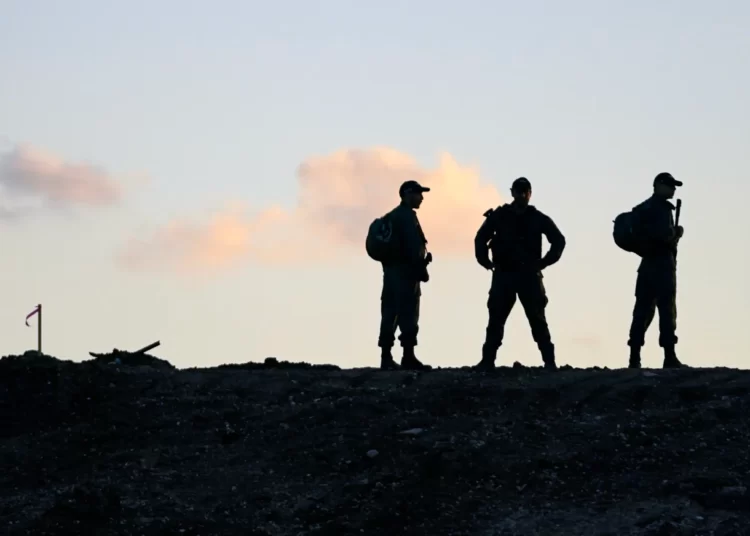Israel now finds itself in search of an exit strategy. For the Resistance front, the optimal scenario entails culminating the October 7th operation with a more substantial strike once Israel has entered Gaza.
By Mahdi Mohammadi
Henceforth, primacy lies with the “geopolitics of war”, an intricate web of calculations woven tightly together by a myriad of actors. In a remarkably brief span of time, the complexity and scope of these calculations and geopolitical interactions have surpassed initial expectations.
The United States is burdened by apprehension that the Al-Aqsa Flood could escalate into a regional battle, recognizing that if Israel ventures into Gaza, the fuse will be ignited. While the US President Biden ostensibly journeyed to Tel Aviv with the intention of providing aid, his true objective was a cautionary message for Israel.
Of greater consequence, the United States is deeply concerned about the Israeli regime’s collapse on the security and political fronts since October 7th. American observers have witnessed the frailty of the regime’s foundations, the feebleness of its security apparatus, the near absence of political cohesion, and the tenuous loyalty of the populace to the system.
According to sources, the primary motive behind the US mobilizing forces in the region is the apprehension that Tel Aviv may swiftly lose both territory and population in a multi-front conflict, ultimately leading to a sudden collapse. A clandestine aspect that the United States maintains concealed is that it would inevitably need to deploy forces in Tel Aviv during that critical phase.
The United States is ill-prepared to engage either on behalf of or alongside Israel. Its trepidation of a surprise strike by Russia and China, the profound concern of becoming a military target of Resistance front in the region, and the antipathy toward Israeli Prime Minister Benjamin Netanyahu are pivotal factors shaping America’s strategy.
Nevertheless, the US itself plays a pivotal role in transforming Israel into a war machine in Gaza, exerting pressure on Palestinians for forced displacement, coercing governments into silence, and orchestrating intricate intelligence operations to assassinate Resistance leaders. Americans are not mere accomplices; they are the architects in all of this.
Other actors, particularly Arab nations, have come to the realization that if Israel endures, it will continue to perpetrate crimes and instigate widespread terror. Egypt, Jordan, and Saudi Arabia desire a weakened Israel, whereas the United States seeks to maintain the status quo under Netanyahu’s leadership, and, in the long term, to empower allies such as Benny Gantz, Bibi’s most viable challenger.
Of all actors involved, Europeans display the greatest fear. The crux of their concern is what actions Russia might take vis-à-vis Ukraine and Europe should the Israeli war hawks thrust the US into a regional war? From the European perspective, this regional conflict has the potential to swiftly escalate into a global crisis in a few days.
Contrary to some emotional analyses, the Resistance front has exhibited wisdom and formidable strength. Netanyahu’s rhetoric of a “credible military threat” has finally materialized at the hands of the Resistance front. While other fronts have been practically opened, the intensity of the conflict is scrupulously managed. The Resistance front refuses to allow Israel to dictate its strategy.
The assault on a hospital in Gaza signifies the political demise of Netanyahu and the military downfall of Yoav Gallant, the defense minister. The Israeli military has reached an impasse, a realization that has been comprehended by all. Israel’s aim, spanning over ten days, is to eradicate any semblance of safety in Gaza, compelling Palestinians to leave. Yet, no one has succumbed to this coercion.
Now, Israel finds itself in search of an exit strategy. For the Resistance front, the optimal scenario entails culminating the October 7th operation with a more substantial strike once Israel has entered Gaza. Nonetheless, the Zionists appear bereft of viable scenarios.
In this intricate battle, patience becomes imperative. Suffering through anguish becomes an integral facet of this dreadful war. However, our minds find solace in knowing that those who determine the course of this conflict exhibit greater courage than any of us while harboring a fervent desire to see the downfall of Israel.
The views expressed in this article are those of the author and do not necessarily reflect the positions of Iran Nuances.






